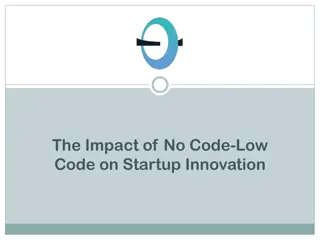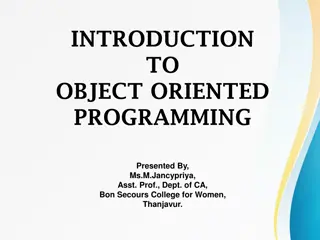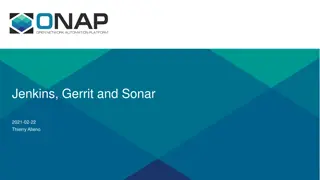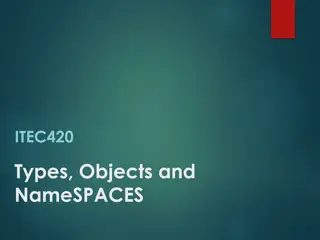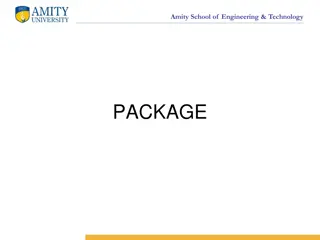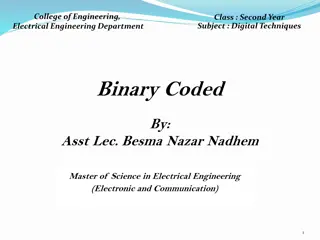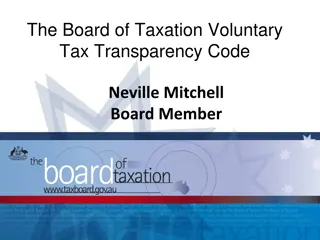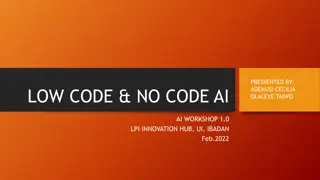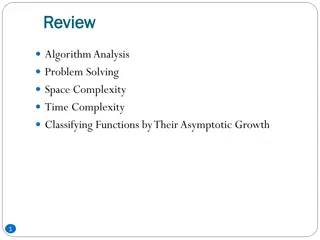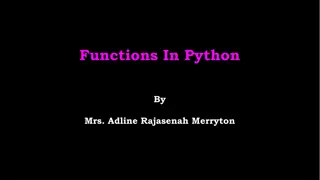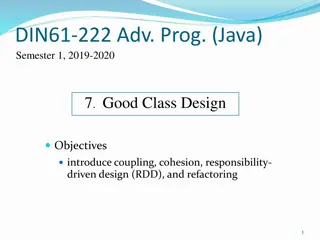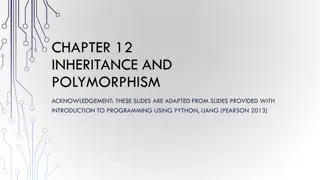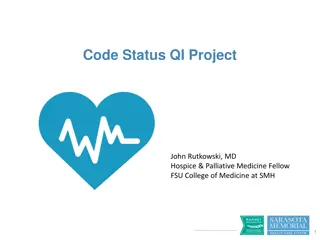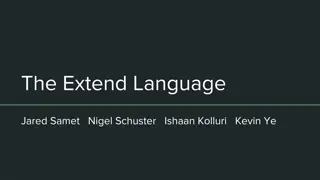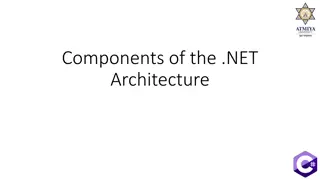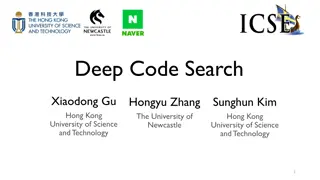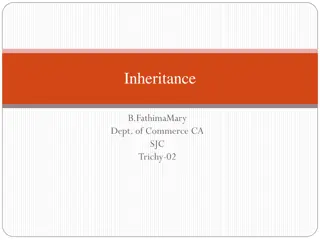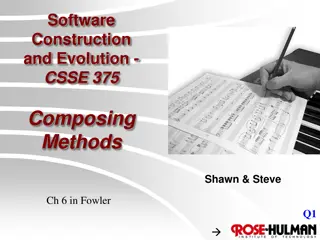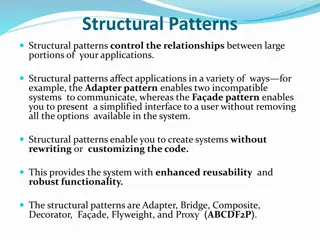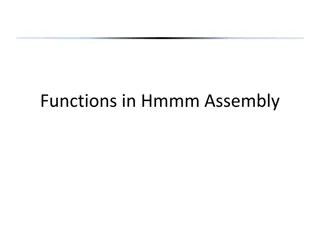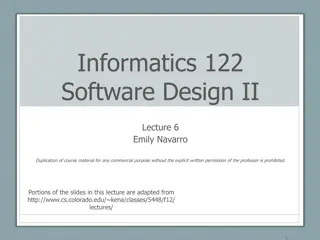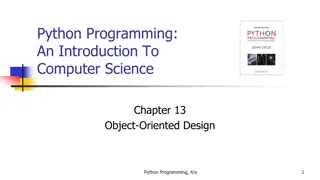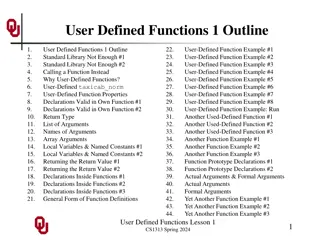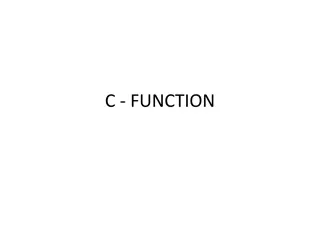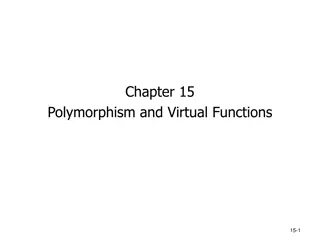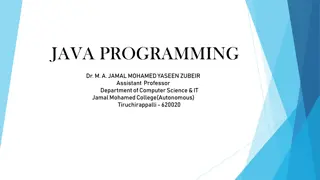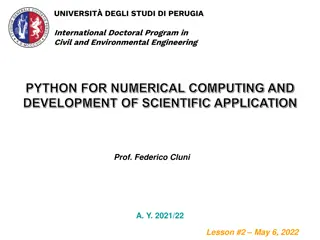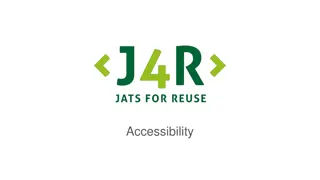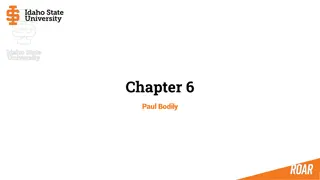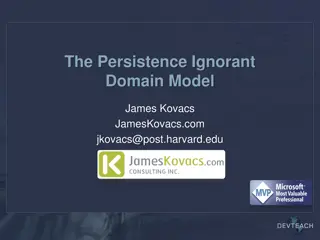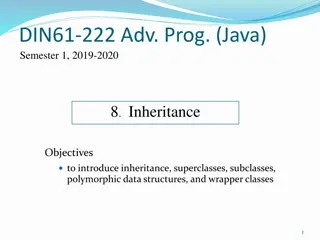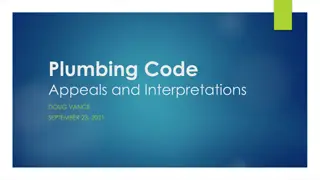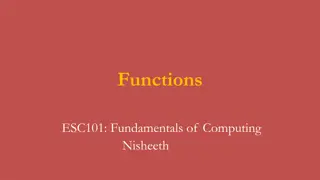The Impact of No Code-Low Code on Startup Innovation
In the vibrant world of startups, innovation is the cornerstone of success. As these businesses aim to carve out their niches, they often face a common hurdle: the extensive resources required for traditional software development. However, the emergence of low code no code (LCNC) platforms is revolu
2 views • 12 slides
Understanding Object Oriented Programming (OOP) Principles
Object-Oriented Programming (OOP) is a software design approach where programmers define data structures and operations. Key principles include objects, classes, data encapsulation, inheritance, polymorphism, and data abstraction. OOP allows for better organization and reusability of code, fostering
0 views • 15 slides
Improving Code Analysis Workflow with Jenkins, Sonar, and Gerrit
Enhance code analysis processes by analyzing source code before merging, enabling analysis in branches, and triggering Jenkins jobs. Sonar.cloud provides options to analyze branches using Maven build, while the proposal suggests using Jenkins plugin for code review. Addressing challenges with Gerrit
1 views • 12 slides
Understanding Classes and Objects in Programming
In programming, classes are fundamental building blocks that define the structure and behavior of objects. Classes contain properties, methods, and events that allow interaction between objects. Objects are instances of classes, created using the `new` keyword. Classes help organize code, encapsulat
0 views • 29 slides
Understanding Java Packages and Their Importance in Programming
An exploration of Java packages, their role in structuring code, organizing classes, and enhancing code reusability. Learn about built-in and user-defined packages, the Java API's package organization, and the different types of packages available in Java programming. Discover how packages help in c
2 views • 18 slides
Understanding Binary Coded Decimal (BCD) and Excess-3 Code
Binary Coded Decimal (BCD) is a binary code used to represent decimal numbers, with the popular 8421 BCD code and its conversion process explained. Additionally, Excess-3 Code, another BCD code, is detailed with an example of finding its code for a given decimal number. Different BCD codes like 4221
0 views • 11 slides
A New Complaint Handling Code for the Sector - Webinar Highlights
This webinar discusses the introduction of a new Complaint Handling Code for the sector, aiming to address issues in social housing complaint processes. It covers key points, the background leading to the code's development, the Ombudsman's experience, and the code's aims and framework towards high-
0 views • 14 slides
The Board of Taxation Voluntary Tax Transparency Code Overview
The Board of Taxation developed a voluntary Tax Transparency Code to address community concerns and promote greater tax transparency among large businesses. The Code outlines recommended disclosures for both large and medium businesses, encouraging adoption of higher disclosure standards. Internatio
0 views • 20 slides
Simplifying AI Development with Low-Code and No-Code Platforms
Explore the world of low-code and no-code AI development platforms, empowering experts to create applications with ease. Learn about the benefits, tools, and components of these innovative platforms, and discover popular AI tools for no-code development. Accelerate your digital transformation journe
0 views • 11 slides
Understanding Pseudo Code and Flow Charts for Algorithm Analysis
Explore the concepts of pseudo code and flow charts for analyzing algorithms, problem-solving, and understanding space and time complexity. Learn about basic elements of pseudo code, assigning operations, and writing effective pseudo code statements in a clear and structured manner. Discover the imp
0 views • 26 slides
Understanding Functions in Python
Functions in Python can be built-in functions provided by Python or functions defined by the user. They enable code reusability by taking inputs, performing computations, and returning results. Function definition, arguments, max function, type conversions are key concepts explored in Python functio
0 views • 11 slides
Exploring Class Design in Java Programming: Coupling, Cohesion, RDD, and Refactoring
Delve into the world of Java programming with a focus on class design principles such as coupling, cohesion, responsibility-driven design (RDD), and refactoring. Understand the importance of good design for code quality, ease of debugging, maintenance, and reusability. Dive into the adventure of Zuu
0 views • 39 slides
Understanding Inheritance and Polymorphism in Python
Exploring the concept of inheritance in object-oriented programming, specifically in Python, to create a hierarchy of classes where subclasses inherit attributes and methods from a superclass. This approach helps to avoid redundancy and promotes code reusability. The relationship between superclasse
0 views • 11 slides
Enhancing Code Status Discussions in End-of-Life Care: A Quality Improvement Project
This project led by Dr. John Rutkowski aims to reduce inappropriate interventions for patients with DNR or Modified Code Status by implementing an improved code status documentation system. Data analysis reveals a need for better documentation practices, and survey responses highlight various challe
0 views • 18 slides
Explore the Extend Language for Declarative Programming
Unveil the Extend language, inspired by the restrictions of spreadsheets, offering a declarative programming approach for reusability. Dive into its basic architecture, lazy evaluation of values, variables handling, and syntax for list comprehensions. Discover its current project status, spanning ov
3 views • 19 slides
Understanding the .NET Architecture Components
The .NET architecture comprises various key components such as the Common Language Specification, Code Manager, Managed Code, Unmanaged Code, and Native Code. These components play crucial roles in the development and execution of applications within the .NET framework. Managed code is executed by t
0 views • 21 slides
Evolution of Separate Compilation and Linking in Computing
Separating compilation and linking processes has been crucial for code reusability and program efficiency in computing history. From the early days of manually recalculating addresses to modern linkers and library routines, the evolution has revolutionized how programs are developed and executed on
0 views • 17 slides
Challenges in Code Search: Understanding, Matching, and Retrieval
Programming can be challenging due to the lack of experience and unfamiliar libraries. Code search engines struggle with representing complex tasks, while information retrieval techniques aim to bridge the gap between source code and natural language queries. The mismatch between high-level intent a
0 views • 21 slides
Understanding Inheritance in Object-Oriented Programming
Inheritance is a fundamental concept in C++ that allows for the creation of new classes based on existing classes. This enables code reusability, organization, and the implementation of a hierarchical structure in programming. By using inheritance, developers can efficiently model relationships betw
0 views • 20 slides
Refactoring Methods for Composing Code in Software Construction
Explore the key concepts of refactoring methods for composing code in software development. Learn about techniques such as Extract Method and how they can improve code readability, maintainability, and reusability. Understand the process of creating well-named methods and optimizing code structure f
0 views • 23 slides
Understanding Structural Patterns in Software Design
Structural patterns play a crucial role in controlling the relationships between different parts of applications, enabling compatibility between systems and simplifying user interfaces. Key patterns like Adapter and Bridge facilitate communication and modular design, enhancing reusability and functi
0 views • 59 slides
Understanding Functions in Programming Languages
Functions in programming serve as blocks of computation that allow for code reusability and organization. They enable modularity and help simplify complex tasks by breaking them down into smaller, manageable parts. This article explores the significance of functions in programming through examples i
0 views • 8 slides
Understanding Template Method Design Pattern in Software Design
Today's lecture covers the Template Method design pattern in software design, focusing on defining the pattern, its structure, and providing an example with Tea and Coffee recipes. The pattern allows subclasses to redefine certain algorithm steps without changing the overall structure, promoting cod
0 views • 40 slides
Software Quality and Source Code Management Best Practices
Effective source code management is crucial for software quality assurance. This involves locking down code, baselining milestones, managing code variants, and ensuring traceability. Software Configuration Management (SCM) is key, encompassing configuration items and core concepts like creating base
0 views • 34 slides
Understanding Object-Oriented Design in Python Programming
Object-Oriented Design (OOD) is a fundamental concept in modern computer applications. It involves structuring systems as black boxes with interfaces, allowing for the encapsulation, polymorphism, and inheritance. OOD separates the implementation details from the user, enabling the design of complex
0 views • 189 slides
Understanding MVC Framework: An Overview
MVC (Model-View-Controller) architecture separates an application into three key components – model, view, and controller. This pattern enhances code reusability, separation of concerns, and business logic organization. Explore the fundamental concepts, components, and communication within MVC for
1 views • 32 slides
Understanding User-Defined Functions in Programming
Explore the significance of user-defined functions in programming by learning how they can optimize code reusability and simplify complex tasks. From creating custom functions to calling them, discover the power and flexibility they offer in enhancing code efficiency.
1 views • 44 slides
Understanding C Functions
C functions are independent blocks of code that perform specific tasks when called, enhancing reusability and understandability in programming. This article covers topics such as C function declaration, return values, parameters, and function definitions in detail, offering insights into how functio
0 views • 92 slides
Multi-Label Code Smell Detection with Hybrid Model based on Deep Learning
Code smells indicate code quality problems and the need for refactoring. This paper introduces a hybrid model for multi-label code smell detection using deep learning, achieving better results on Java projects from Github. The model extracts multi-level code representation and applies deep learning
0 views • 10 slides
Understanding Polymorphism and Virtual Functions in C++
Polymorphism and virtual functions play a key role in C++ programming, allowing for flexibility and extensibility in code through type compatibility, type casts, pointers, inheritance, and overridden functions. By leveraging these concepts, developers can create efficient and maintainable code struc
0 views • 34 slides
Fundamentals of Object-Oriented Programming in Java
Object-Oriented Programming (OOP) is a methodology that simplifies software development by using classes and objects. This paradigm includes concepts like Object, Class, Inheritance, Polymorphism, Abstraction, and Encapsulation. Other terms used in OOP design include Coupling, Cohesion, Association,
0 views • 54 slides
Python Functions for Numerical Computing and Scientific Applications
Functions in Python allow for effective code organization and reusability. This lesson covers defining functions with default values, handling multiple arguments, and advanced argument passing techniques. Examples include doubling a number, calculating sum and difference, and processing lists and di
0 views • 21 slides
Understanding Inheritance in Object-Oriented Programming
Inheritance allows a class to inherit properties and characteristics from another class, promoting code reusability and reducing duplication. It is a fundamental feature in Object-Oriented Programming that enhances modularity and scalability by structuring classes hierarchically. Different modes and
0 views • 50 slides
Enhancing Scholarly Content Reusability through Accessibility in JATS XML
Explore the importance of accessibility in JATS XML for scholarly content reusability. Understand the significance of meeting accessibility recommendations, implications for different reader groups, and the impact on creating accessible documents in various formats. Delve into key questions guiding
0 views • 27 slides
Enhancing Programming Skills: Iteration and Problem Solving in CS Course
Central concepts of iteration and problem-solving techniques in a Computer Science course are explored and valued by students in Chapter 6. Feedback highlights the effectiveness of TA support, engaging teaching methods, and practical exercises. Suggestions for improvement include better alignment of
0 views • 12 slides
Understanding Persistence Ignorance in Domain Models
Persistence Ignorance is a concept in software development where domain models do not contain any persistence-related code, focusing solely on business logic. This approach promotes separation of concerns, single responsibility, loose coupling, testability, and reusability. NHibernate and Plain Old
0 views • 8 slides
Introduction to Inheritance and Polymorphism in Java Programming
This course material covers the concepts of inheritance, superclasses, subclasses, polymorphic data structures, and wrapper classes in Java programming. It introduces the DoME example - a multimedia entertainment database, showcasing the implementation of classes like CD and DVD. The details of CD a
0 views • 54 slides
Plumbing Code Appeals and Interpretations Overview
This document provides information on the agenda, upcoming professional development events, Building Code Appeal Board, Appeal Board decisions, Code Interpretation Committee, code interpretations, and final thoughts related to plumbing code appeals and interpretations. It covers the appeal process,
0 views • 8 slides
Understanding Functions in C Programming
Functions play a crucial role in C programming, allowing for modularity and reusability of code. This content covers the basics of functions, creating custom functions, passing arguments, returning values, and the anatomy of a C function. Learn about defining functions, passing arguments effectively
0 views • 24 slides
Enhancing Data Reusability: Challenges and Strategies
The WDS/RDA Assessment of Data Fitness for Use Working Group addresses common challenges faced by researchers in utilizing data from repositories, emphasizing the importance of comprehensive assessment and reliability. The focus is on improving the reusability of datasets by ensuring they meet quali
0 views • 43 slides
